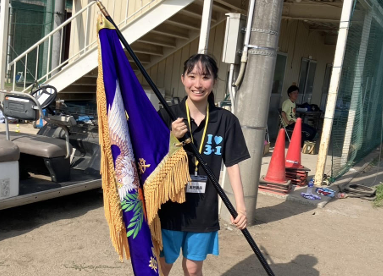Q&A with TOMODACHI Program Participants and TOMODACHI Alumni: Chiaki Nakawatari

Chiaki Nakawatari is a 2024 TOMODACHI Amway Japan Foundation Tohoku Future Leader Program alumna. She is currently a third-year student at Ofunato High School in Iwate Prefecture. As the student council president, she has led several initiatives, including changing the school uniform policy, setting up a student opinion box, and establishing an on-campus bookstore, in addition to fulfilling her regular duties on the council.At Ofunato High School, Chiaki also serves as the manager of the boys’ tennis team, president of the campus Junior Red Cross, and a member of the News Club. As part of the News Club, she competed in a national competition last year.
Following a forest fire in Ofunato City early last year, she took an initiative to organize a volunteer group at her school and currently serves as its representative. The group continues to collaborate with the City Activity Center, the Youth Center, and the local Social Welfare Council to share information about volunteer opportunities. The group now has 176 student members.The volunteer group is planning to have a booth at the upcoming “FIGHT BACK” music festival in Morioka City.
Please tell us why you wanted to join the TOMODACHI Program.
I wanted to join the TOMODACHI Program because I wanted to do something that would be useful for my future. My goal is to create a community in Rikuzentakata, and this seemed like it would be useful towards it.
On the TOMODACHI Program, what personal changes surprised you the most?
After joining the program, what changed the most was how I was able to clearly express myself. Thanks to this I could form my words into real student council activities, and in various other opportunities I’ve been able to better express myself. I was most surprised over this.
Did becoming student council president and participating in the TOMODACHI Program influence changes in your perception of leadership?
It changed considerably. Before, I thought a leader was someone who just led a team or organization. But after participating in the TOMODACHI Program, I learned that leaders could join their teams as indispensable facilitators or accompanists. They could be someone important who moves and supports from behind the scenes. As the student council president, I thought I would be the one to lead our team, but since I learned I could rely on those around me for a wide range of activities things have changed.
Could you tell us the activities you’ve done as student council president? Also, is there anything else you would like to do going forward?
Since becoming student council president, some of the largest actions I’ve overseen were changing school uniforms, creating an opinion box system, and managing school events.As student council president, I’d have wanted to work more closely with the local community. However, my term as president ends after the summer vacation in late August.Changing the topic, what made me want to work with the community began in February. In the latter half of the month, a large forest fire burned through a mountain at night.
Do you have any future goals or ambitions?
My future goal is to start a business in Rikuzentakata City. I thought that I would like to make a business where people can feel comfortable. Specifically, like a cafeteria or small farm. This business could revitalize agriculture and have local restaurants participate in the cafeteria. My image is to have it offer lower priced products and hope that it would be used by children or to help working people.
From your experience on the program, what have you gained or learned?
On the TOMODACHI Program I connected with many kinds of people. Adults I had met at program training, people I met when I went to the US, and many others who I’m still connected to today during my student council activities and personal events. I’ve learned the importance of human connections and community from this experience.
What does TOMODACHI mean to you?
It’s like a diverging point in life, an important point. I think that without it I wouldn’t have as much courage, confidence, and solid experiences.
If you could deliver a message to future high schoolers who want to participate in the TOMODACHI Program, what would you say?
If you’re not sure about whether to do it or not, you should. This program is an experience that you can use in your future. If you firmly feel you should join, I’d like you to give it your all. Opportunities like this don’t come around often! Of course, you should enjoy this as much as you can. But I hope you’ll take it seriously when you go.
If you’re bad at English, translation apps are easily available, so you shouldn’t worry about it. I used a translation app when I talked with people, and a little bit of effort to try and speak with your conversation partner can change their responses. I’d like to get across that challenging yourself is important.
I think that the TOMODACHI Program is something you can use to grow, so I hope you can participate. For me, my future was deeply influenced by joining — so much so that my goals and what I want to do have changed. I think it was a deeply important event.
From here on there will probably be many high schoolers who want to participate, I want to tell them to not be afraid!
This alumni highlight interview was conducted on July 21, 2025 by Karina Quinn. She is a TOMODACHI Alumni Program intern.


